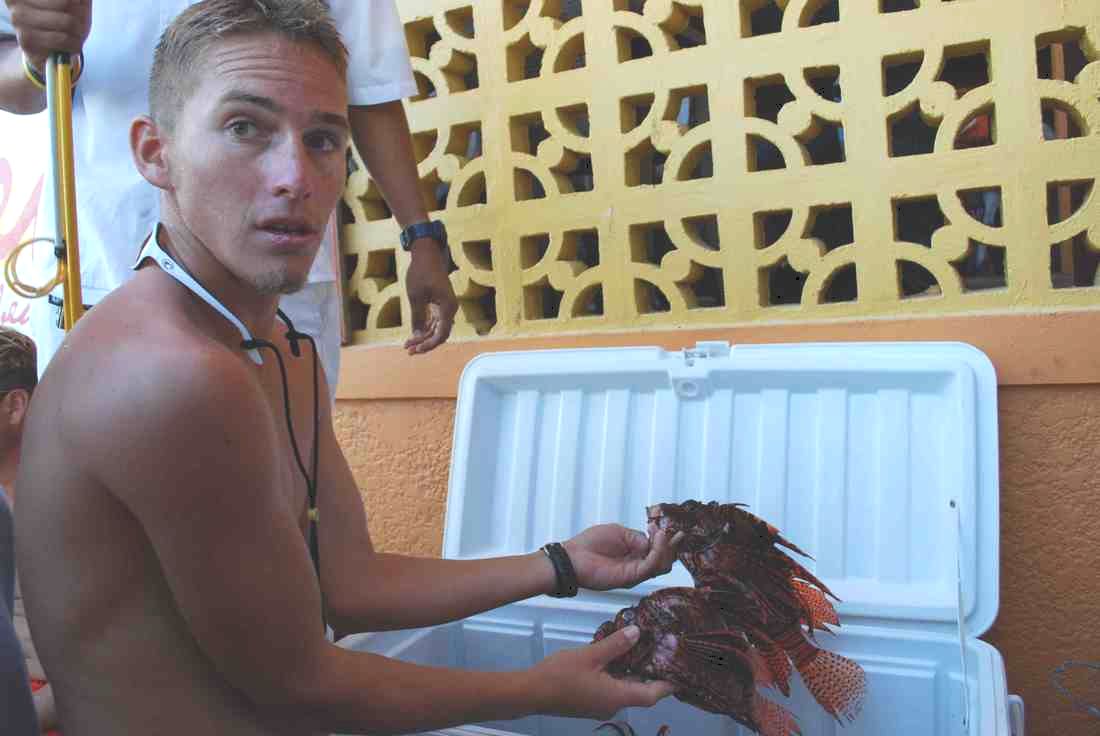IMPACTS - PROS & CONS
When lionfish were first observed on reefs in the Atlantic and Caribbean, scientists were concerned about the impact lionfish would have on native marine life. Coral reefs were already under threat from disease, increased temperature and climate change. Many important fishery products, including fin fish and lobster, which could be on the lionfish's diet, were also under extreme fishing pressure. Scientists were concerned how the lionfish would impact our already stressed coral reef ecosystem.
Scientists have been studying the impact of lionfish for more than 10 years. Early studies showed a notable impact on fish assemblages, while more recent studies suggest that lionfish have integrated into the Caribbean seascape. Certainly lionfish are here to stay, and may only be the first invasive fish introduced into the Atlantic Ocean.
Scientists have been studying the impact of lionfish for more than 10 years. Early studies showed a notable impact on fish assemblages, while more recent studies suggest that lionfish have integrated into the Caribbean seascape. Certainly lionfish are here to stay, and may only be the first invasive fish introduced into the Atlantic Ocean.
CONS
Impact on Coral Reefs
Early studies on fish abundance surveys on coral reefs in the Bahamas observed that net recruitment was reduced by 79% on reefs with lionfish, compared to reefs without lionfish. This is possibly due to the fact that lionfish have no natural predators in the Atlantic Ocean to keep their numbers in balance. Thus the concern is that lionfish will have a negative impact on coral reefs, and the two industries that relay heavily on healthy reefs, fisheries and tourism.
Lionfish consume critical herbivorous species, like juvenile parrotfish and other wrasse that are important grazers keeping coral reefs clean and free of algae. Lionfish have also been found to consume crustaceans. While primarily crabs and shrimp are found in gut content analysis of lionfish captured on coral reefs, if studies were done on stomach contents of lionfish that live in the mangroves, where juvenile lobster find shelter, remains of lobster may be found.
Impact on Fisheries
Studies on stomach contents of lionfish have confirmed that lionfish eat fish and crustaceans, that are important to reefs, and to almost 50% of the population of Belize whose livelihoods depend upon healthy reefs.
Early studies on fish abundance surveys on coral reefs in the Bahamas observed that net recruitment was reduced by 79% on reefs with lionfish, compared to reefs without lionfish. This is possibly due to the fact that lionfish have no natural predators in the Atlantic Ocean to keep their numbers in balance. Thus the concern is that lionfish will have a negative impact on coral reefs, and the two industries that relay heavily on healthy reefs, fisheries and tourism.
Lionfish consume critical herbivorous species, like juvenile parrotfish and other wrasse that are important grazers keeping coral reefs clean and free of algae. Lionfish have also been found to consume crustaceans. While primarily crabs and shrimp are found in gut content analysis of lionfish captured on coral reefs, if studies were done on stomach contents of lionfish that live in the mangroves, where juvenile lobster find shelter, remains of lobster may be found.
Impact on Fisheries
Studies on stomach contents of lionfish have confirmed that lionfish eat fish and crustaceans, that are important to reefs, and to almost 50% of the population of Belize whose livelihoods depend upon healthy reefs.
PROS
While it is not possible to eradicate lionfish, Belizeans and others throughout the Caribbean are finding ways to benefit from lionfish!
High Demand
Lionfish are in high demand and fillet pays fishermen up to US $6/pound. The demand in Belize cannot be met by fishers, much less the United States, where companies have been reaching out to Belize for years, while they try to find a steady and abundant supply of lionfish to satisfy the US seafood market.
Artisan Boom
Local artisans have been resourceful and are making jewelry out of lionfish spines which has become very popular. The production of jewelry has empowered women's groups throughout Belize.
Marine Tourism
Most scuba divers enjoy underwater hunting and if properly managed marine tourism could get a boost if dive centers and resorts promote the Invasive Lionfish Tracker Specialty Course. Visitors can sign up for the online course, complete the practical in Belize, pay the license fee to the Fisheries Department and start shooting lionfish!
More divers, more specialties =
more cash for instructors and resorts and Belize!
High Demand
Lionfish are in high demand and fillet pays fishermen up to US $6/pound. The demand in Belize cannot be met by fishers, much less the United States, where companies have been reaching out to Belize for years, while they try to find a steady and abundant supply of lionfish to satisfy the US seafood market.
Artisan Boom
Local artisans have been resourceful and are making jewelry out of lionfish spines which has become very popular. The production of jewelry has empowered women's groups throughout Belize.
Marine Tourism
Most scuba divers enjoy underwater hunting and if properly managed marine tourism could get a boost if dive centers and resorts promote the Invasive Lionfish Tracker Specialty Course. Visitors can sign up for the online course, complete the practical in Belize, pay the license fee to the Fisheries Department and start shooting lionfish!
More divers, more specialties =
more cash for instructors and resorts and Belize!



